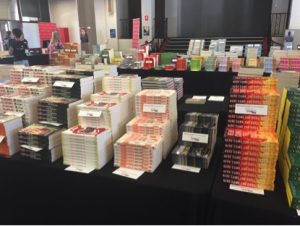By Rashida Murphy
These days I write the word ‘writer’ on forms that ask me what I do. I know I’ve earned it. I am that person – a published novelist. Publication has changed the way I view my profession. The secret is out. I can own it. Even when I’m questioned and occasionally challenged. ‘What do you write?’ is the inevitable question and these days I have an answer. Sometimes that answer – fiction, is followed by another question – what sort? This leads to conversations, which in most part are educational, entertaining or informative. I may hear the idea of a story I really ought to write or I may be asked to read 500 pages of this story they wrote when their dad was a lad during the war. Of course, everyone knows someone who writes and surely, as a writer I must know them too. Occasionally the conversation turns to my ability to speak English so well, the colour of my skin and my good fortune that Australia allows me to do whatever I want to. Because in Sri Lanka, Afghanistan, Fiji or wherever I come from, opportunities for women are so limited, you know, because they don’t even let women drive there.
Once, at a regional writers’ festival, I participated in two well-attended, thoughtful panels on writing, loss and culture. Discussions ranged over the conditions of loss and the ability to make sense of that loss as an immigrant writer. At the end, there were questions and after that, book signings. A tall, lovely looking woman with a colonial accent chatted to me while I signed her book. I handed over the book and looked up at her and smiled. She frowned down at me and asked, ‘why is it that you people never talk about the advantages this country offers you? Why aren’t you grateful you are living here? I’ve been to your country – women don’t have toilets and go in the fields. That’s where you come from – and now look at you. I get it – you’ve lost that, but have you gained nothing?’
Racism can be insistent (like a sty in your eye) or unseen (like a tumour). Mostly I ignore daily microaggressions. Everything from having conversations directed to my White husband, and the assumption that I must need him as an interpreter, to having my name mispronounced to the point of hilarity. A consistent microaggression is the old White guy who comes really close and touches whichever part of my anatomy is accessible; arm, face or hair, followed by a stumbling pat or hug because he once went to Nepal or Pakistan and ‘knows’ women like me. Except they couldn’t speak English and wasn’t I lucky to find a man here? Apparently, I am the generic South Asian/Middle Eastern woman, and I should be able to answer for everything from a lack of toilets in India to Saudi women being unable to drive cars until recently.
Then there was that time I was at a library. Another well-attended, sold-out event, with several books sold, to the delight of the local bookseller who also attended. I read from my novel, spoke about the length of time required to write and re-write, the path to publication and the thrill of seeing my story in people’s homes. An elderly woman sat in the front row and stared at me all through my talk. Now, as people stood up and moved, lining up for signed copies of my novel, this woman continued to sit, a sturdy foot out firmly, obliging me to go around the back of her chair to get to the signing table, delicious with multiple copies of my novel. She tapped my arm as I tried to slide past and I looked at her. ‘Don’t you get tired of peddling your wares?’ she asked. ‘If this is what I had to do to sell a few copies of a book, I know I wouldn’t bother. I suppose you don’t have an Australian publicist who can manage these things for you.’
My usual reaction to racism, (and I have had over 34 years to get used to it), is always the same. I shut down. I lower my eyes. I smile weakly. I walk away. I was raised to show respect to people even when they were entirely undeserving of it. But I was never taught how to respond to racism. That I had to learn on my own.
Why do white people assume that asking rude questions is okay if addressed to a person of colour? Do they think brown people are incapable of understanding nuanced racism? Why does a statement that includes my good fortune in being allowed to live here follow every compliment? Would the tall White woman at the writers’ festival ask a Jewish person why the Holocaust continues to haunt entire generations? Would the woman at the library ask Jodie Picoult why she was peddling her wares after an author talk? I am by no means suggesting that my stories are as gravely important as those of the Jewish diaspora or as popular as Ms Picoult’s. And I’d be really interested to know how many of my White female friends are randomly touched by strange men during conversations.
I am a writer. I am an introvert. I am entirely comfortable in my own skin and company. I have consciously shrunk my world to keep out a steady barrage of ‘harmless’ comments. But I still want to be able to interact in my own city and country without needing several days to recover from each encounter. Perth is a modern city with over 2 million people, of whom about 41% come from non-English speaking countries. How long must I wait to feel like this is my home and not a colonial outpost, used to ‘women like me’ being subservient and voiceless?
Feature image by Toa Heftiba on Unsplash
Other images provided by Rashida Murphy
Rashida Murphy is the author of The Historian’s Daughter which is available for purchase here: https://uwap.uwa.edu.au/collections/rashida-murphy She is currently working on her second novel.


